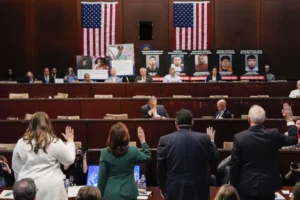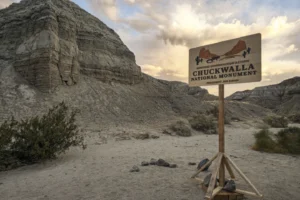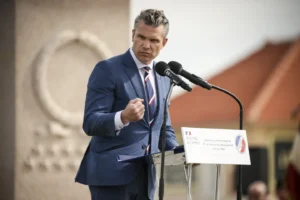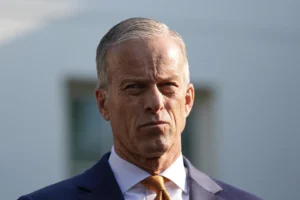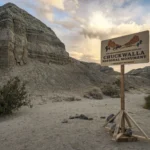Governor Blasts Biden’s Energy Policies, Lays Out Priorities in Address
Gordon says state must protect its water resources amid drought
- Published In: Politics
- Last Updated: Jan 12, 2023
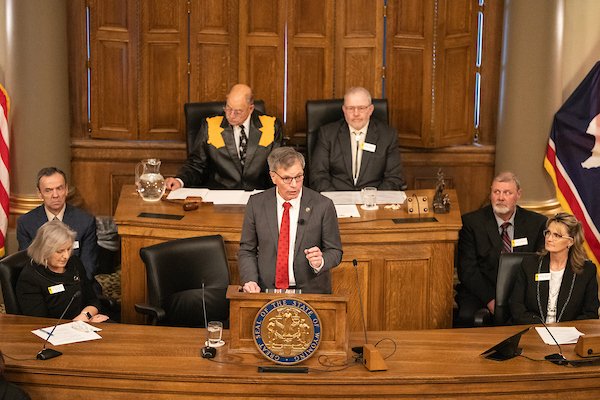
Gov. Mark Gordon delivers the State of the State to the 67th Legislature on Wednesday at the Wyoming State Capitol. Gordon laid out his priorities in the annual address. (Photo by Michael Smith)
By CJ Baker
Special to the Wyoming Truth
Gov. Mark Gordon declared Wednesday that “the state of Wyoming is strong and her future is bright.” However, he painted a much darker picture of the federal government.
During his annual State of the State address, Gordon said the state is challenging “federal overreach and over regulation” in more than 30 lawsuits that have ranged from pushing back on vaccine mandates to supporting stronger U.S. borders and calling for state management of grizzly bears. But it was another subject of Wyoming’s litigation that was squarely in the governor’s sights on Wednesday: President Joe Biden’s fossil fuel-averse energy agenda.
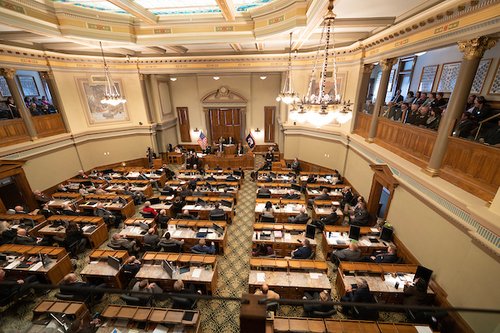
In his remarks, Gordon tied the administration’s policies to $5 a gallon gasoline, the highest inflation in decades and power grid issues that threaten to leave some American families “freezing in the dark.”
“Polite people say that’s what you get when a federal government is hostage to zealots that would risk third world living conditions in order to meet their agenda,” Gordon said.. “Blunter people — and we have a few here in Wyoming — would say that Washington, D.C., bureaucrats bungled the energy policy because they pulled it out of what they’re sitting on, when we know it is the solution that we’re standing on.”
The line, promoting Wyoming’s minerals, drew applause and cheers from those in the House chamber. But Gordon also cautioned that change is coming, and that innovations like carbon capture technology are needed “if we are to address climate change and provide a catalyst in the path forward for fossil fuel production.”
The state’s economy has also changed, becoming less dependent on minerals. Gordon described it as Wyoming’s most diverse economy in 50 years.
“We’re not leaving any of our legacy industries behind,” he said. “But it’s exciting to note that other sectors are growing.”
Over the last decade, Gordon said the state has seen double-digit growth in leisure and hospitality, manufacturing, finance and insurance, and professional and business services.
“And this isn’t slowing down,” he said. “Businesses from around the state are looking to expand, and those in other parts of the country are looking to relocate to Wyoming.”
As for the long-running question of how to retain Wyoming’s youth, Gordon suggested “new educational opportunities” may be needed. His advisory group recently concluded that the state should offer more career and technical education options and shift to student-centered learning that emphasizes subject mastery over seat time.
“Now is the critical time for education,” he said, “and we must be bold and take action.”

Less water and more revenue
Gordon also said action is needed amid the region’s historic drought. He said the dry conditions will almost certainly lead to water rights being curtailed, particularly in the Colorado River Basin.
“It’s undeniable that Wyoming’s irrigators, municipalities and industries are at risk of losing some of the authority they have over their future,” Gordon said, calling it “essential that we protect our water.”
Among other steps, he asked the Legislature to fund new dams and grants for water-related projects in Wyoming communities.
Despite receiving a recent influx of revenue from “federal government largesse and energy markets,” Gordon warned that the state needs to prepare for leaner times. He’s proposed leaving $2 billion in the Legislature’s so-called rainy day fund, but said being prudent “is more than just being cheap.”
As one example, he said lawmakers should raise wages for troopers, snowplow drivers, nurses, social workers and other state workers, who are making less than colleagues elsewhere.
“We can’t retain or recruit them if we don’t pay a fair day’s wage for a fair day’s work,” Gordon said, calling current vacancy rates “extremely high.”
Missing people and mental health struggles
Gordon spent a portion of his address on issues facing the Eastern Shoshone and Northern Arapaho tribes, including “the epidemic of missing person cases afflicting tribal communities.” He urged lawmakers to pass legislation that would let the state join the National Ashanti Alert System, which provides AMBER-like alerts for missing or at-risk adults.
“It is a needed solution to help all Wyoming people,” Gordon said, adding, “It’s an opportunity to stop more missing person cases at their inception, as well as taking a meaningful step towards curbing human trafficking.”
The governor also spoke of mental health, which he described as “a nationwide crisis.”
“Depression, substance abuse, isolation and suicidal thoughts are all too prevalent in all of Wyoming’s demographics. We’re losing too many of our youth, too many of our veterans, too many of our neighbors,” Gordon said.
Wyoming recently created its own 24/7 suicide hotline, available at any time by calling 988, and Gordon praised the new service. However, he said the state must also work to reach people before they are in crisis — and to improve the healthcare system in general.
“All people need access to affordable and quality healthcare,” Gordon said.
He did not mention a renewed push to expand Medicaid nor did he bring up any hot button social issues.
More than 100 elected officials attended Wednesday’s address, rising multiple times to join Gordon in applauding several exceptional Wyomingites in attendance. That included an ovation for county clerks and elections workers who, as Gordon put it, “assured that our elections were secure and correct here in Wyoming.”
In closing, the governor encouraged the members of the 67th Legislature to “have a servant’s heart, so that we can each do our share of the task in making this special place we call home thrive long into the future.”

